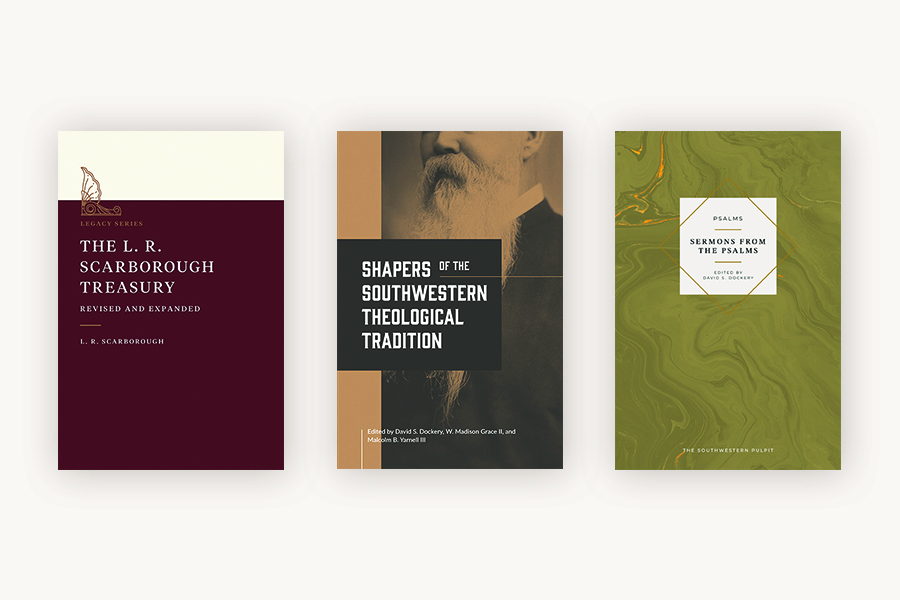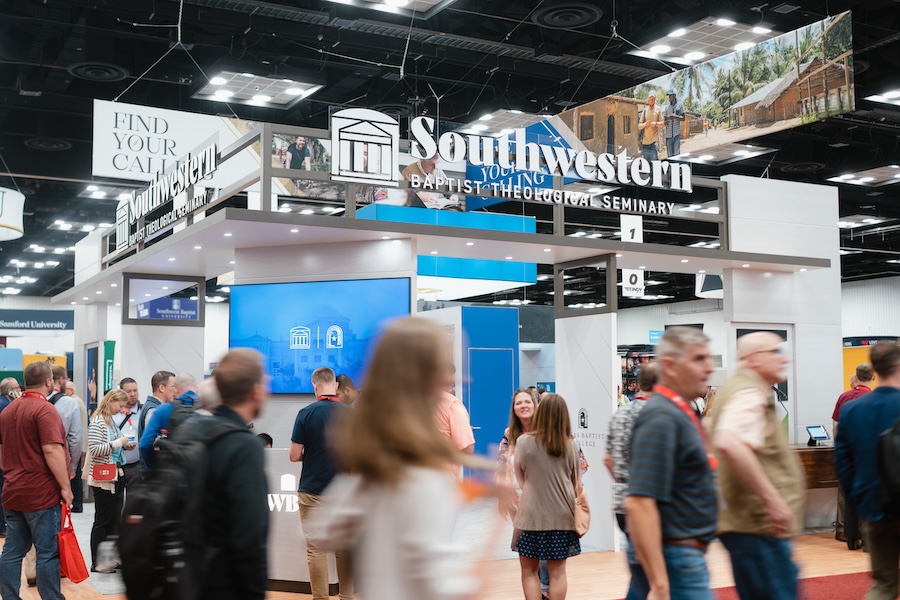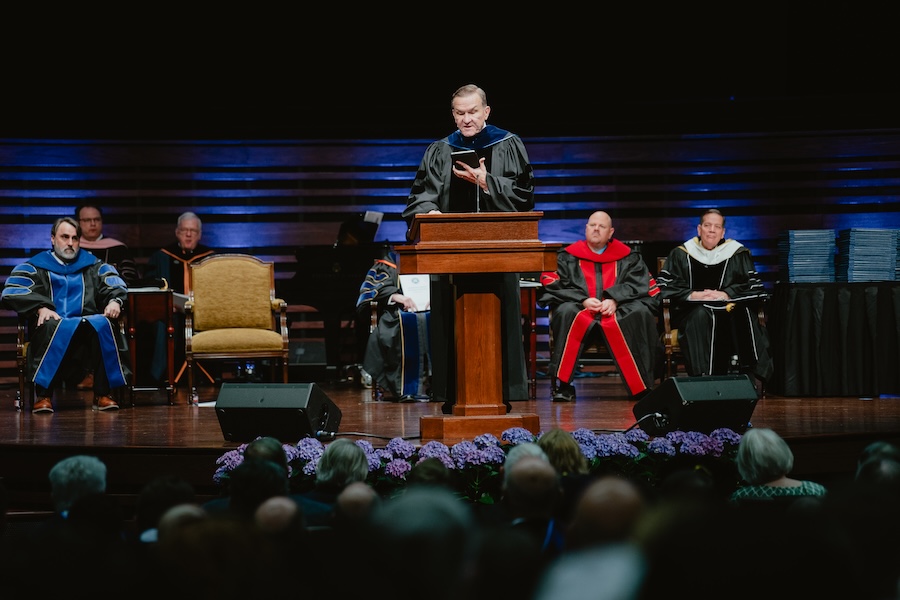Southwestern Seminary ‘not in a crisis,’ but financial challenges must be addressed, Dockery tells trustees

Southwestern Baptist Theological Seminary is “not in a crisis” but financial challenges “could quickly escalate to a crisis if we do not aggressively move to address them,” Interim President David S. Dockery told the seminary’s Board of Trustees today during its first regularly scheduled meeting since the resignation of former president Adam W. Greenway.
During the meeting, trustees approved a new academic chair and its first occupant, filled another academic chair, approved three new academic programs, and took other actions, all of which were approved unanimously.
In addition to the full board meeting held on Oct. 18, trustees met in committee meetings and executive sessions of the full board on Oct. 17 for total of at least 12 hours over the course of the two-day meeting.
Pointing to the seminary’s history of innovation in theological education in its founding of first-ever evangelism, Christian education, and church music programs, Dockery said the institution’s “pioneering strategies that shaped this seminary in last century must again become the guiding spirit as we look to the future with a spirit of innovation, creativity, and hopefulness.”
Dockery said the seminary campus is “giving its full attention to the care of students, to the importance of prayer” and “recognizing our total dependence on the Lord at this time,” noting multiple prayer gatherings that have begun and his announcement of Psalm 90:17 as the theme verse for the academic year. “The seminary community is praying not only for the Lord’s provision and favor but for genuine renewal to come to the Southwestern campus,” he said.
Joined by Chairman Danny Roberts and O.S. Hawkins, senior advisor and ambassador-at-large, Dockery told trustees of budget restructuring plans reducing the operational and personnel budget by at least 10 percent representing approximately $3.6 million, largely in the area of institutional support starting with programming before personnel. All three leaders spoke of new policies and procedures being implemented—what Roberts called “new financial guardrails.” Dockery noted some of the financial challenges facing the institution “reflect multi-faceted matters covering a number of years.”
Dockery also noted trustees have been evaluating for several years the “campus footprint and its optimal use.” While the 200-acre campus is a blessing, it also “presents significant challenges. For this institution to have a sustainable business model, we must reduce our campus footprint and the resource commitment it takes to maintain it.”
As part of that effort, Dockery said seminary officials have been preparing to sell the B.H. Carroll Park Apartments for several years due to “mounting maintenance and renovation costs.” The property, which is “not contiguous with the main campus and is more than 50 years old,” has been listed for sale and several offers have been made. Current residents will be able to continue living at Carroll Park throughout the current academic year, at least, he said.
Trustees and administration will be seeking “to identify other pieces of land surrounding the main campus that could be sold … to invest more resources in that which is core to our mission, providing theological education to the next generation of pastors, missionaries, and church leaders,” he said.
Dockery and Hawkins were named to their interim leadership roles during a special-called trustee meeting, Sept. 27.
Roberts recounted for trustees the circumstances that led to Greenway’s resignation, speaking candidly about the Sept. 22 Executive Committee meeting and the “difficult decisions” made by trustees. Noting his role in Greenway’s election as ninth president, Roberts said he is “convinced” God led the search committee and board to Greenway, who “accepted a very difficult assignment, which was further complicated” by the COVID-19 pandemic.
“Over time, unfortunately, several patterns developed that board officers and the Executive Committee had a duty to address,” he said. “As those became known, they were addressed in an appropriate manner. Significant financial challenges compounded a growing sense of concern among our board leadership.”
Among “areas of concern,” Roberts said, “were dysfunctionality amongst senior leadership, budget mismanagement, overspending resulting in hundreds of thousands of dollars of deficits per month, and attempts to pass the blame for these matters onto three different chief financial officers who were each removed. More recently, it became clear that action was required after evidence emerged of escalating morale problem in the institution, especially among the faculty, and a resistance to safeguards board leadership wanted to implement.”
By the end of the Executive Committee meeting, Greenway “offered his resignation and the trustees accepted that resignation,” Roberts said.
Roberts praised the interim leadership of Dockery and Hawkins.
“In God’s good providence, He has provided to Southwestern an exceptional team as our interim leadership in Dr. David Dockery and in Dr. O.S. Hawkins—two leaders in Southern Baptist life who are universally respected and loved,” he said. “These Southern Baptist Convention statesmen with long track records of success as executives are Southwesterners who know this institution intimately and are invested very deeply in its history—and they are committed to our seminary’s future.”
He reported trustees would name a presidential search committee later.
Roberts also addressed the trustees’ role in reviewing seminary financial details.
“In executive session, trustees had access to any and all information they requested, including expenses and other expenditures that led us into serious financial concerns,” he said. “As a result, we are requesting the auditors to do some additional work to carefully examine all expenditures, especially those which raised concerns. We will govern Southwestern with the highest standards of financial accountability by implementing new processes and procedures to put new financial guardrails in place, and our new leadership is committed to manage spending aggressively.”
The chairman also said trustees “remain unwavering in our commitment to our doctrinal standards as expressed in the Baptist Faith and Message, starting with a complete confidence in the inerrant Word of God as our only guide for our faith and practice.”
Roberts said the seminary is “not dependent on just one man,” noting the institution is “blessed with a faculty of scholar-ministers who love, serve, and equip students for Gospel ministry. The faculty is the curriculum, and our curriculum here at Southwestern is strong.”
The full statements by Roberts and Dockery have been posted to the seminary website.
Hawkins noted that he had a prepared statement that would be made available to the trustees and the press, but he wanted to offer a “personal word” about why he agreed to serve.
Noting the 25 years he worked alongside the board of trustees of Guidestone Financial Resources as president of that entity, Hawkins thanked the board of trustees for its service. He said Southern Baptists should know “you have been the most engaged group of men and women I have ever seen.”
Hawkins said that “every question you had has been asked, an openness that perhaps has never been seen before.” He commended the leadership of Roberts and said the board has worked with an “openness and seeking to be true stewards” of the institution. Southwestern’s trustees are becoming “the standard for what every board of trustees ought to be and needs to do in SBC life.”
Hawkins reminded the board, “We’re stewards of a big vision,” reflecting on the history of the seminary.
“What a rich heritage and history that you hold in your hand, this stewardship of this ministry that has sent scores of thousands of men and women to the ends of the earth across the decades, sharing the old, oft-repeated story of Christ and His love, the Gospel, the message of Christ,” Hawkins said.
He said he sensed an obligation to take the role with the seminary at the age of 75 and to do so as a volunteer because “I owe a debt to this place,” citing the “legacy” of those who have been trained at the school.
Hawkins, who earned both the Master of Divinity (1974) and Doctor of Philosophy (2020) from Southwestern Seminary, has been appointed by Dockery as senior professor of pastoral ministry.
John Rayburn, chairman of the Institutional Administration Committee, expressed confidence in the current interim administration, particularly noting the work of Michele G. Smith, interim vice president for financial services.
During the meeting, trustees approved various recommendations.
Acting on recommendations from the Institutional Administration Committee, trustees directed its Executive Committee to reevaluate the procedures of administration and board regarding hiring and firing senior officers, and authorized the administration to negotiate a line of credit for the institution in collaboration with the committee.
Trustees also approved the establishment of a new academic chair, the Malcolm R. and Melba McDow Chair of Evangelism in the Roy J. Fish School of Evangelism and Missions, honoring the former evangelism professor of the seminary, and named Carl J. Bradford, assistant professor of evangelism, as the first occupant of the chair, effective Jan. 1, 2023. Bradford has served at the seminary since 2018.
Matthew McKellar, professor of preaching at Southwestern Seminary since 2010, was elected to fill the George W. Truett Chair of Ministry in the School of Theology, effective Jan. 1, 2023.
Trustees approved the Academic Administration Committee’s recommendation to consider a revised draft of the “One Southwestern: 2025” Academic Plan during the spring 2023 trustee meeting, at the request of the interim president.
Three curriculum recommendations were also approved by trustees establishing the Graduate Certificate in Worship Leadership in the School of Church Music and Worship, the Undergraduate Certificate in Faith and Culture in Texas Baptist College, and a Doctor of Ministry Concentration in Biblical Theology in the School of Theology.
In other actions, trustees approved fall 2022 graduates nominated by faculty and certified by the registrar as having met the requirements for their degrees, amendments to the seminary’s bylaws, and a new and revised corporate resolution.



